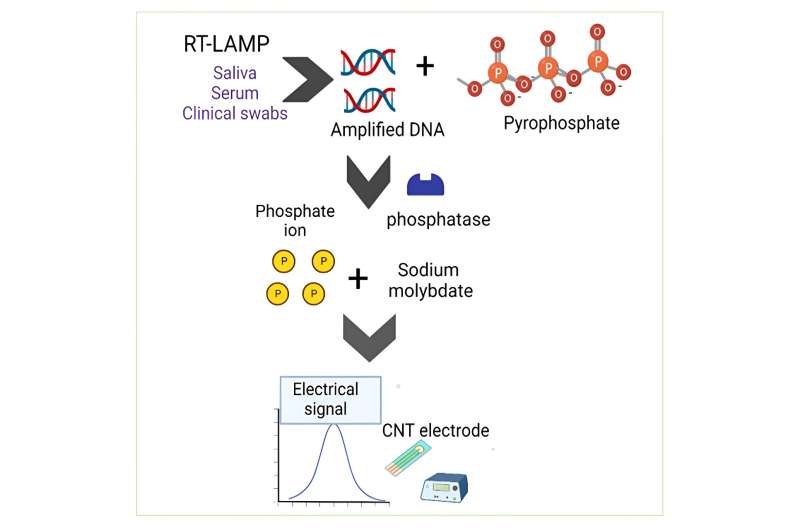This article has been reviewed according to Science X's editorial process and policies. Editors have highlighted the following attributes while ensuring the content's credibility:
fact-checked
peer-reviewed publication
trusted source
proofread
New rapid electronic diagnostic test for infectious diseases

A new molecular test for bacteria and viruses, including SARS-CoV-2 has been developed by scientists at the University of Surrey, as they warn that the world needs to be prepared for the next pandemic.
The research team, led by Professor Johnjoe McFadden, has developed a new molecular test, called "Electro-chemical LAMP" (eLAMP), that is affordable, rapid, sensitive and can be performed at home, in a GP surgery or in a hospital lab. eLAMP has the sensitivity of lab-based polymerase chain reaction (PCR) tests but, when connected to a smartphone could be performed at home.
eLAMP converts the output of a PCR-like test, called LAMP, into a simple electric current. This electrochemical test device is compact, and scientists are already exploring its potential to be further miniaturized into a simple memory-stick-sized device that could be operated by anyone with an app. This would allow the test to be performed at home and the result to be instantly sent to health services to monitor the spread of infection, while also providing the patient with immediate advice.
Professor Johnjoe McFadden, corresponding author of the study and Professor of Molecular Genetics at the University of Surrey, said, "A key lesson we took from the COVID-19 pandemic is how crucial rapid, effective and cheap diagnostic tools that can be used at home are to monitoring and containing infectious diseases. Our test meets these criteria and can detect lower amounts of the SARS-CoV-2 virus compared to other home-based tests. We are looking for commercial partners to further develop the test and take it to market."
Researchers tested human blood, saliva, and swabs from the nose and throat. They found that their test had a 93.33% detection accuracy rate. The test also performs well at room temperature, with the ability to bring up results in 45 minutes. A study on Surrey's test has been published by iScience.
In March 2020, the World Health Organization announced that the coronavirus, also known as SARS-CoV-2, had become a global pandemic. Since then, nearly six million people have died, and around two million new cases are reported worldwide every day. The virus mostly affects people's lungs, causing symptoms such as coughing, fever, and trouble breathing. In severe cases, it can lead to heart problems and failure of other organs. The virus spreads through the air and by close contact with infected people.
Dr. Khushboo Borah Slater, co-author of the study from the University of Surrey, said, "SARS-CoV-2 is likely to be around for a long time and, unfortunately, new difficult viruses are likely to emerge. It's crucial to keep working on better ways to test for the coronavirus, and our goal is to further develop our test so that it can be easily used everywhere to help control the disease and prevent future outbreaks."
More information: Khushboo Borah Slater et al, Development of a loop-mediated isothermal amplification (LAMP)-based electrochemical test for rapid detection of SARS-CoV-2, iScience (2023). DOI: 10.1016/j.isci.2023.107570



















